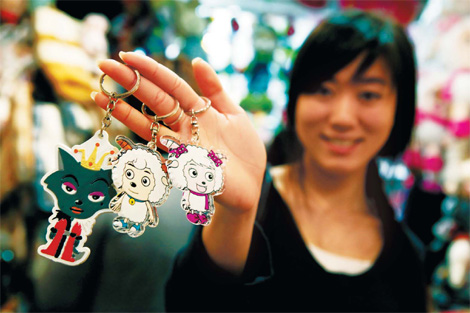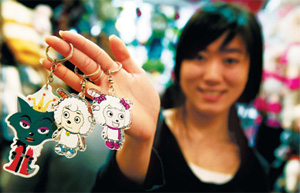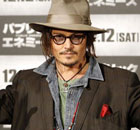Top Biz News
Original pirate material
By Raymond Zhou (China Daily)
Updated: 2009-12-11 08:03
|
An assistant in a Beijing shopping center displays keychains with images from the popular cartoon series Pleasant Goat and Big, Big Wolf. [China Daily] |
Last week I attended a forum in Guangzhou about the creative industry, a fancy word for things as old as book publishing, as new as e-books and everything in between.
Guangdong province, of which Guangzhou is the capital, is often bypassed when visitors look for culture. It is connected to Shenzhen and Hong Kong and is known as "the world's factory floor", not "the world's drawing board". Dismayed officials want to change that perception.
"Do you know we have been No 1 in the culture business for six consecutive years?" says Lai Bin, a provincial publicity officer. At 227 billion yuan ($33 billion) for 2008, Guangdong's cultural industries accounted for 6.4 percent of its GDP and experienced a growth rate of 13.8 percent. But Lai admits that size does not equal weight. "Our businesses are mostly small, financing difficult and brands few."

One local brand that has made it big is Pleasant Goat and Big, Big Wolf (Xiyangyang Yu Huitailang), also translated as Happy Sheep and Gray Wolf, arguably China's most popular cartoon series currently being aired. But Liu Manyi, general manager of Creative Power Entertaining Inc, the firm behind the hit show, is not laughing to the bank. Instead she is bitter: "Pirate discs were all over the street before our first movie hit the screen. One character endorses children's medicine, another plugs contraceptives, and their images appear on all kinds of products. All this without proper licensing."
The company, which only broke even when the series turned into a runaway hit, is now spending tons of money chasing pirates. It has been guerilla warfare. Bootleggers do not usually register their business. When they are caught, the court generally gives them a slap on the wrist, to the tune of a 10,000-50,000 yuan fine.
"It is such a weak deterrent that in one case we had to retroactively grant a license to the offender," complains Liu.
|
||||
In case you don't know, China produces the largest amount of animated programming in the world. But quantity is not quality. Behind every Pleasant Goat there are tens of thousands of flops.
This year China is expected to amass a total of 130,000 minutes of domestically produced animation programs, but it's doubtful whether this is worth one Kungfu Panda, the animated movie released by DreamWorks.
Rolf Gesen, a Berlin-based film archivist who teaches at Beijing Communication University, attributes the failure to students who are too obsessed with technology and influenced by Japanese anime.
"(The animations) are just like junk food," he laments, "without roots in their own culture or emotional exchange ... the roles tend to be wooden, which makes it difficult for audiences, domestic or international, to identify with."














